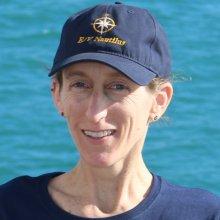
Stace Beaulieu
Tell us about your work / research. What kinds of things do you do?
I am a biological oceanographer, and I study the biodiversity and distribution of life in the ocean and on the seafloor. My specialty is the invertebrates of the deep seafloor, including early life history stages (larvae). I also developed a database for all locations on Earth where hydrothermal vents have been observed at the seafloor. In addition to research and data management, I teach and am involved in public outreach.
What sparked your initial interest in your career?
I grew up near the ocean and started snorkeling at a very young age. I was intrigued by the diversity of different animals that I could observe underwater. I was only about 6 or 7 years old when I decided to become a deep-sea biologist.
Who influenced you or encouraged you the most?
My parents encouraged me at a young age, and I started doing science fairs in middle school. I am very fortunate to have had some wonderful research mentors through my involvement in science fairs in high school, and then in undergraduate research.
What element of your work / study do you think is the most fascinating?
It is truly exciting to go out to sea on a research cruise and be able to observe and sample at a deep-sea hydrothermal vent. The excitement can also continue back on shore, months later, at the lab, when sorting a sample and finding an organism that I have never seen before, and working with colleagues to figure out what it is.
What other jobs led you to your current career?
After I received my Ph.D. degree, I became a postdoctoral researcher at Woods Hole Oceanographic Institution. I joined the Technical Staff and have been in Woods Hole for almost 20 years now.
What are your degrees and certifications?
B.S. and M.S. in Biological Sciences - Stanford University 1992; Ph.D. in Biological Oceanography - University of California San Diego 1998
What are your hobbies?
I like mountain biking, kayaking, and other outdoor activities.
What advice would you give to someone who wants to have a career like yours?
I think for a career in science that it is important to have a good background in math, but also in writing and communication skills. It is also helpful to learn computer programming skills.
How did you get involved with the Nautilus Exploration Program? How did you get on the ship?
I wrote a research proposal with my colleagues to request a cruise with the E/V Nautilus.
Expeditions
Stace participated in the following Ocean Exploration Trust expeditions:
